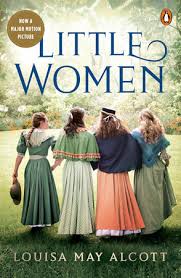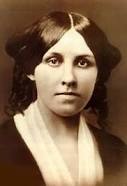Little Women Page #6
Little Women is a novel by American author Louisa May Alcott which was originally published in two volumes in 1868 and 1869. Alcott wrote the book over several months at the request of her publisher.
Charms and potions canst thou brew? Bring me here, with elfin speed, The fragrant philter which I need. Make it sweet and swift and strong, Spirit, answer now my song! A soft strain of music sounded, and then at the back of the cave appeared a little figure in cloudy white, with glittering wings, golden hair, and a garland of roses on its head. Waving a wand, it sang... Hither I come, From my airy home, Afar in the silver moon. Take the magic spell, And use it well, Or its power will vanish soon! And dropping a small, gilded bottle at the witch's feet, the spirit vanished. Another chant from Hagar produced another apparition, not a lovely one, for with a bang an ugly black imp appeared and, having croaked a reply, tossed a dark bottle at Hugo and disappeared with a mocking laugh. Having warbled his thanks and put the potions in his boots, Hugo departed, and Hagar informed the audience that as he had killed a few of her friends in times past, she had cursed him, and intends to thwart his plans, and be revenged on him. Then the curtain fell, and the audience reposed and ate candy while discussing the merits of the play. A good deal of hammering went on before the curtain rose again, but when it became evident what a masterpiece of stage carpentery had been got up, no one murmured at the delay. It was truly superb. A tower rose to the ceiling, halfway up appeared a window with a lamp burning in it, and behind the white curtain appeared Zara in a lovely blue and silver dress, waiting for Roderigo. He came in gorgeous array, with plumed cap, red cloak, chestnut lovelocks, a guitar, and the boots, of course. Kneeling at the foot of the tower, he sang a serenade in melting tones. Zara replied and, after a musical dialogue, consented to fly. Then came the grand effect of the play. Roderigo produced a rope ladder, with five steps to it, threw up one end, and invited Zara to descend. Timidly she crept from her lattice, put her hand on Roderigo's shoulder, and was about to leap gracefully down when "Alas! Alas for Zara!" she forgot her train. It caught in the window, the tower tottered, leaned forward, fell with a crash, and buried the unhappy lovers in the ruins. A universal shriek arose as the russet boots waved wildly from the wreck and a golden head emerged, exclaiming, "I told you so! I told you so!" With wonderful presence of mind, Don Pedro, the cruel sire, rushed in, dragged out his daughter, with a hasty aside... "Don't laugh! Act as if it was all right!" and, ordering Roderigo up, banished him from the kingdom with wrath and scorn. Though decidedly shaken by the fall from the tower upon him, Roderigo defied the old gentleman and refused to stir. This dauntless example fired Zara. She also defied her sire, and he ordered them both to the deepest dungeons of the castle. A stout little retainer came in with chains and led them away, looking very much frightened and evidently forgetting the speech he ought to have made. Act third was the castle hall, and here Hagar appeared, having come to free the lovers and finish Hugo. She hears him coming and hides, sees him put the potions into two cups of wine and bid the timid little servant, "Bear them to the captives in their cells, and tell them I shall come anon." The servant takes Hugo aside to tell him something, and Hagar changes the cups for two others which are harmless. Ferdinando, the 'minion', carries them away, and Hagar puts back the cup which holds the poison meant for Roderigo. Hugo, getting thirsty after a long warble, drinks it, loses his wits, and after a good deal of clutching and stamping, falls flat and dies, while Hagar informs him what she has done in a song of exquisite power and melody. This was a truly thrilling scene, though some persons might have thought that the sudden tumbling down of a quantity of long red hair rather marred the effect of the villain's death. He was called before the curtain, and with great propriety appeared, leading Hagar, whose singing was considered more wonderful than all the rest of the performance put together. Act fourth displayed the despairing Roderigo on the point of stabbing himself because he has been told that Zara has deserted him. Just as the dagger is at his heart, a lovely song is sung under his window, informing him that Zara is true but in danger, and he can save her if he will. A key is thrown in, which unlocks the door, and in a spasm of rapture he tears off his chains and rushes away to find and rescue his lady love. Act fifth opened with a stormy scene between Zara and Don Pedro. He wishes her to go into a convent, but she won't hear of it, and after a touching appeal, is about to faint when Roderigo dashes in and demands her hand. Don Pedro refuses, because he is not rich. They shout and gesticulate tremendously but cannot agree, and Rodrigo is about to bear away the exhausted Zara, when the timid servant enters with a letter and a bag from Hagar, who has mysteriously disappeared. The latter informs the party that she bequeaths untold wealth to the young pair and an awful doom to Don Pedro, if he doesn't make them happy. The bag is opened, and several quarts of tin money shower down upon the stage till it is quite glorified with the glitter. This entirely softens the stern sire. He consents without a murmur, all join in a joyful chorus, and the curtain falls upon the lovers kneeling to receive Don Pedro's blessing in attitudes of the most romantic grace. Tumultuous applause followed but received an unexpected check, for the cot bed, on which the dress circle was built, suddenly shut up and extinguished the enthusiastic audience. Roderigo and Don Pedro flew to the rescue, and all were taken out unhurt, though many were speechless with laughter. The excitement had hardly subsided when Hannah appeared, with "Mrs. March's compliments, and would the ladies walk down to supper." This was a surprise even to the actors, and when they saw the table, they looked at one another in rapturous amazement. It was like Marmee to get up a little treat for them, but anything so fine as this was unheard of since the departed days of plenty. There was ice cream, actually two dishes of it, pink and white, and cake and fruit and distracting French bonbons and, in the middle of the table, four great bouquets of hot house flowers. It quite took their breath away, and they stared first at the table and then at their mother, who looked as if she enjoyed it immensely. "Is it fairies?" asked Amy. "Santa Claus," said Beth. "Mother did it." And Meg smiled her sweetest, in spite of her gray beard and white eyebrows. "Aunt March had a good fit and sent the supper," cried Jo, with a sudden inspiration. "All wrong. Old Mr. Laurence sent it," replied Mrs. March. "The Laurence boy's grandfather! What in the world put such a thing into his head? We don't know him!" exclaimed Meg. "Hannah told one of his servants about your breakfast party. He is an odd old gentleman, but that pleased him. He knew my father years ago, and he sent me a polite note this afternoon, saying he hoped I would allow him to express his friendly feeling toward my children by sending them a few trifles in honor of the day. I could not refuse, and so you have a little feast at night to make up for the bread-and-milk breakfast."
Translation
Translate and read this book in other languages:
Select another language:
- - Select -
- 简体中文 (Chinese - Simplified)
- 繁體中文 (Chinese - Traditional)
- Español (Spanish)
- Esperanto (Esperanto)
- 日本語 (Japanese)
- Português (Portuguese)
- Deutsch (German)
- العربية (Arabic)
- Français (French)
- Русский (Russian)
- ಕನ್ನಡ (Kannada)
- 한국어 (Korean)
- עברית (Hebrew)
- Gaeilge (Irish)
- Українська (Ukrainian)
- اردو (Urdu)
- Magyar (Hungarian)
- मानक हिन्दी (Hindi)
- Indonesia (Indonesian)
- Italiano (Italian)
- தமிழ் (Tamil)
- Türkçe (Turkish)
- తెలుగు (Telugu)
- ภาษาไทย (Thai)
- Tiếng Việt (Vietnamese)
- Čeština (Czech)
- Polski (Polish)
- Bahasa Indonesia (Indonesian)
- Românește (Romanian)
- Nederlands (Dutch)
- Ελληνικά (Greek)
- Latinum (Latin)
- Svenska (Swedish)
- Dansk (Danish)
- Suomi (Finnish)
- فارسی (Persian)
- ייִדיש (Yiddish)
- հայերեն (Armenian)
- Norsk (Norwegian)
- English (English)
Citation
Use the citation below to add this book to your bibliography:
Style:MLAChicagoAPA
"Little Women Books." Literature.com. STANDS4 LLC, 2025. Web. 23 Feb. 2025. <https://www.literature.com/book/little_women_328>.








Discuss this Little Women book with the community:
Report Comment
We're doing our best to make sure our content is useful, accurate and safe.
If by any chance you spot an inappropriate comment while navigating through our website please use this form to let us know, and we'll take care of it shortly.
Attachment
You need to be logged in to favorite.
Log In